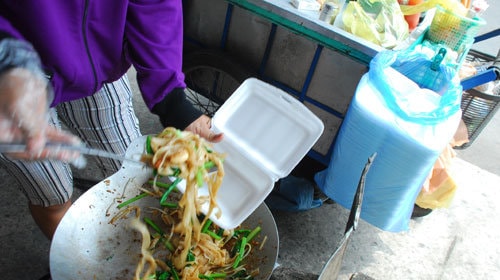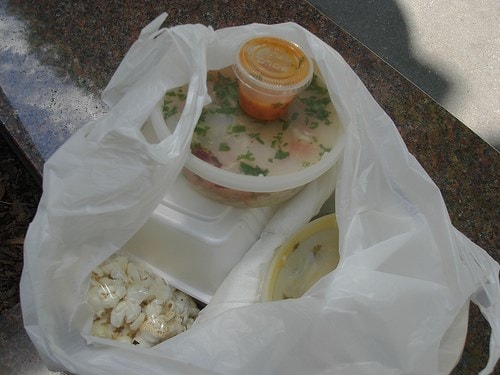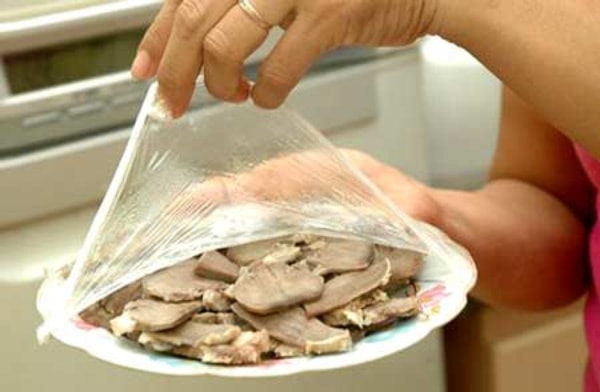Plastic bags – How to use them without being poisoned?
Suckhoedoisong.vn - According to Associate Professor Nguyen Duy Thinh, plastic bags or foam boxes used to store hot foods such as hot soy milk, corn water, soup, rice... at 78-80oC or plastic wrap that melts after heating food in a microwave oven will easily release DOP (dioctin phthalate) into the food. If exposed to this substance for a long time, boys may become feminized and infertile, while girls are at risk of early puberty.
Through the reporter's investigation, the plastic bag wholesalers at some large markets in Hanoi said that they sell about 30-40kg of bags every day, priced from 2,300 - 4,500 VND/tael. The traders said: Plastic bags containing vegetables, meat... at the market are made from recycled plastic. Just by looking at them, you can tell which bags are good, which are bad, and even where they are produced.
The people who buy these plastic bags said that they usually buy them in Hanoi such as Trung Van, Tu Liem, La Phu, An Khanh, Hoai Duc, Hanoi and in neighboring provinces of Hanoi such as Hung Yen, Nam Dinh, Hai Phong, etc. However, when asked about the quality of the bags, these traders said that they and many consumers do not care about the quality of the bags. This is a potential danger that can damage the health of consumers.

Plastic bags or foam boxes used to store hot foods such as hot soy milk, corn water, soup, rice... at 78-80oC or plastic wrap that melts after heating food in a microwave oven will easily release DOP (dioctin phthalate) into the food.
Heavy metal contamination with cadmium and lead due to the use of plastic bags
Associate Professor, Dr. Nguyen Duy Thinh - Former lecturer of the Institute of Biotechnology and Food Technology, Hanoi University of Science and Technology, said that currently, Vietnam is using mostly recycled plastic bags, causing many risks of lead and cadmium contamination for users.
There are two types of plastic bags: The first type is made from 100% virgin PV and PP plastic particles from pure petroleum. This type of plastic is not toxic to humans.
The second type (the type we are commonly using) is plastic bags recycled from many used plastic products. Among them, there are even paint cans, toilet bowl cleaner bottles... During the recycling process, handmade plastic will absorb heavy metals such as cadmium, lead... (substances that lead to cancer).

If you eat food contaminated with long-term substancesDOP (dioctin phthalate) from melted nylon, boys may experience feminization, male infertility, and girls are at risk of premature puberty.
According to Associate Professor Thinh, the process of toxic contamination from plastic bags occurs more strongly when exposed to high heat. Plastic bags or foam boxes used to store hot foods such as hot soy milk, corn water, soup, rice at 78-80oC will cause the additives to soften, make the plastic bag flexible, and toughen, causing side effects and easily leaching toxic substances into the food.
One of those substances is DOP (dioctin phthalate), which is similar to female hormones, so it is very harmful to men and children whose reproductive organs are not yet fully developed. If exposed to this substance for a long time, boys can become feminized and become infertile, while girls are at risk of early puberty.
Associate Professor Thinh especially noted that absolutely do not use plastic wrap on the surface of food to heat in the microwave. After being heated in the microwave to 300 - 500oC, these plastic wraps will melt and the plastic will stick to the food.
Therefore, to use plastic bags safely, people should choose colorless bags with high transparency, gloss, bright colors, and the surface of the product is not rough or scratched. Limit the use of plastic to store hot, sour, spicy foods...

Never use plastic wrap on the surface of food to heat in the microwave. After being heated in the microwave to 300 - 500oC, these plastic wraps will melt and the plastic will stick to the food.
Associate Professor Nguyen Duy Thinh said: Currently, scientists around the world and in Vietnam are researching to create plastic bags that are a mixture of 60% regular plastic and 30% starch (usually wheat flour). This type of bag will only take 3-5 years to decompose, not 500 years like the recycled plastic bags currently used. It is expected that this product will cost more than plastic bags and will be widely used in the future.
Thanh Loan
